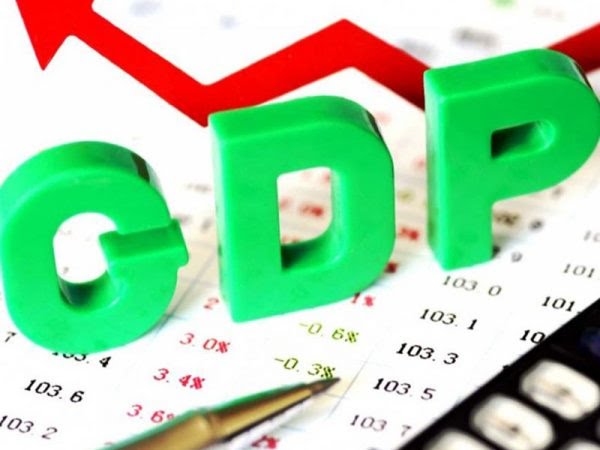The National Bureau of Statistics (NBS) has revealed that Nigeria’s Gross Domestic Product (GDP) grew by 2.98% (year-on-year) in real terms in the first quarter of 2024.
According to the Nigerian Gross Domestic Product Report for Q1 2024 released by the NBS, the GDP growth rate is higher than the 2.31% recorded in the first quarter of 2023 and lower than the fourth quarter of 2023, which was 3.46%.
The NBS report further indicated that the performance of the GDP in the first quarter of 2024 was driven mainly by the Services sector, which recorded a growth of 4.32% and contributed 58.04% to the aggregate GDP.
The agriculture sector grew by 0.18%, from the growth of -0.90% recorded in the first quarter of 2023. The growth of the industry sector was 2.19%, which is an improvement from 0.31% recorded in the first quarter of 2023. In terms of share of the GDP, the services sector contributed more to the aggregate GDP in the first quarter of 2024 compared to the corresponding quarter of 2023
NBS begins rebasing of GDP, CPI
Meanwhile, the National Bureau of Statistics says it has begun the process of rebasing the country’s gross domestic product (GDP) and consumer prices index (CPI) estimates. This was made known by the Statistician-General of the Federation, Adeyemi Adeniran, at a sensitisation workshop for stakeholders on the GDP and CPI rebasing exercise in Abuja.
GDP rebasing is the process of replacing old base year price structure in compiling volume measures of GDP with a new or more recent base year, and is usually carried out every five years. The rebasing of GDP and CPI planned by the NBS will change the size of Nigeria’s GDP and rate of the inflation at the end of the exercise, providing a more accurate picture of the Nigerian economy.
Adeniran said there was a need to ensure accuracy and timely data in today’s rapidly changing and interconnected world.
“When the decision was made to embark on the rebasing exercise, we made it a cardinal objective to ensure inclusivity, collaboration, and partnership throughout the process of these rebasing exercises,” he said.
“Our experience in recent times has shown that we have no other option than to continue to engage and foster partnerships with all constituents of the statistical system for better results.
“As a matter of fact, we are expanding the system to accommodate more stakeholders (producers, suppliers, users of data), to ensure that we harness all available avenues and opportunities to collect, process, and disseminate statistics to support policy decision-making and monitoring in Nigeria”, he added.
A Professor of Economics, Ode Ojowu, who is a former DG of the National Planning Commission and one-time Chief Economic Adviser to president Olusegun Obasanjo, while speaking pointed out that since the last rebasing of GDP in 2014, Nigeria has experienced significant structural changes in various sectors.
“These include the rapid growth of technology and digital sectors, such as fintech, e-commerce, and digital services,” Ojowu said.
“Additionally, the agricultural sector has seen the emergence of new value chains, including agribusiness, processing, commodity exchanges, and export activities, as well as the growth of renewable energy sources like solar power.
“The entertainment and creative industry has also witnessed significant growth, with the skit industry, Nollywood, and music production gaining international recognition. Furthermore, urbanization and infrastructural development have led to an increase in the value of real estate”, he stated.
Prof. Ojowu noted that rebasing of the CPI and GDP will capture these sectoral shifts and will result in changes to the current macroeconomic indicators used by the government to guide policymaking.
“For example, in 2013, some financial indicators were lower than in the pre-rebased period, with the private sector credit to GDP dropping from 37.2 (before rebasing) to 19.7 percent (after rebasing) in 2013 and expanding to 27.2 per cent in 2023. Broad money supply declined from 35.8 (before rebasing) to 18.9 percent of GDP (after rebasing) in 2013 and rose to 34.3 percent of GDP in 2023,” he said.
“From the policy perspective, these ‘overnight’ drops looked like a lower private sector credit expansion and constrained financial system development.
“In 2014 the rebased GDP pushed the debt stock-to-GDP ratio down from 23.7 to 12.5 per cent in 2013. But within the decade, the government has again ramped up the ratio to 42.3 per cent. At the current ratio of 42.3 per cent, debt service is threatening the fiscal stability of the state.
“With the anticipated lower debt-to-GDP after rebasing, could the government be tempted to expand its debt closer to the international threshold? What would such a move imply for the fiscal viability of the state?
“The previous rebasing of the GDP, the federal government tax revenue to GDP fell from 11.3 percent to 6 percent in 2013.
“Deploying various tax measures, tax revenue to GDP improved to 10.9 percent of GDP in 2023, which is still among the lowest in the world. With the anticipated rebasing of the GDP, Nigeria’s tax-to-GDP ratio could drop significantly. Will the government be tempted to then raise taxes to ramp up the tax revenue as a percent of the GDP?”, Prof. Ojowu queried.

